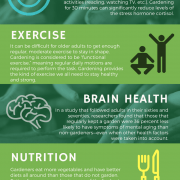10 Micronutrients that Work the Hardest for Your Health
You need all 13 of the essential vitamins and 14 essential minerals to maintain health. But let’s be honest—some essential micronutrients perform a larger variety of jobs than others.
No offense to nutrients like molybdenum—with its focus on supporting detoxification processes—but the list below highlights the 10 multitasking micronutrients you need to acquire from your diet.
Vitamin D
The sunshine vitamin is a fat-soluble force for good all over your body. The spotlight shines brightly on vitamin D’s role in supporting bone health—by helping maintain balanced levels of calcium in your blood.
But vitamin D also helps:
- Support healthy immune function
- Maintain a balanced mood
- Support cardiovascular health by helping maintain healthy blood pressure already in the normal range
Exposing your skin to the sun will help your body make vitamin D. You can also add a supplement, fatty fish, and fortified dairy or grains to your diet.
Deepen your connection to vitamin D.
Magnesium
It’s called a macromineral for a reason. Your body’s vociferous appetite for magnesium stems from the mineral’s participation in 300-plus enzyme systems. This nutritional jack-of-all-trades plays a role in:
- Supporting energy production
- Helping maintain healthy calcium levels
- Supporting normal, healthy insulin function and blood glucose levels already in the normal range
- Bone-health maintenance
Maximize your magnesium knowledge.
Vitamin C
You know vitamin C. It’s possibly the most well-known nutrient in the world. Much study has revealed wide-ranging impacts on maintaining your health.
- Acts as an antioxidant, helping protect you from free radicals by shedding electrons to neutralize damaging compounds
- Helps support collagen production, which is important for skin-health maintenance
- Plays an important part in maintaining healthy immune function through support for white-blood-cell production and protection
- Supports cardiovascular health
See more information about Vitamin C.
Calcium
The connection to supporting bone health is so strong you may miss calcium’s incredible versatility. This amazing mineral:
- Supports cardiovascular health and normal, healthy blood clotting
- Helps maintain healthy cellular communication through its role in cell signaling all around your body
- Supports muscle movements—both contraction and relaxation require calcium
- Aids in the maintenance of healthy nerve function
Solidify your understanding of calcium.
Vitamin A
Being a fat-soluble-free-radical fighter is just the start of vitamin A’s supernutrient origin story. Sure, it acts as a powerful antioxidant. But did you know its support for healthy cellular differentiation expands vitamin A’s role throughout your body?
Your eyes, skin, reproductive system, as well as organs and tissues throughout your body are supported by this essential nutrient. It also helps maintain healthy cell growth and communication, supports healthy immune function, and is a component in a key protein for your vision.
Earn top marks for your vitamin A knowledge.
Copper
Don’t let the trace-mineral tag fool you. Copper is key to help building a healthy body. Here’s what it does for you:
- Supports the construction of connective tissue throughout your body
- Helps maintain healthy red-blood-cell production
- Supports your brain and nervous system
- Aids in cardiovascular-health maintenance by supporting healthy blood vessels
- Supports energy production and cellular respiration
- Helps maintain immune function and bone health
And it even acts as an antioxidant—although indirectly.
Connect with the science of copper.
Biotin
You can call it vitamin B7 or biotin. Either way, it will help all over your body—from supporting energy production to maintaining healthy cell signaling.
Biotin is also frequently talked about in the context of supporting healthy hair. But it does so much more. It also helps maintain healthy bones and normal gene expression, while supporting the production of glucose from sources other than carbohydrates.
Boost what you know about biotin.
Phosphorous
It’s no small feat being second to calcium on the list of the body’s abundant minerals. That’s how important phosphorous is, though. You need it to support energy production—and you have adenosine triphosphate (ATP) to thank for that.
Phosphorous also:
- Supports bone and cellular health
- Helps maintain healthy cell signaling
- Supports protein synthesis
- Works with B vitamins to help support heart, kidney, muscle, and nerve health
Familiarize yourself with phosphorous.
Vitamin B6
Over 100 of your body’s enzymes wouldn’t be the same without vitamin B6. Let’s jump right to the list—because it’s a long one.
- Supports production of glucose from the stored sugar molecule glycogen
- Helps maintain immune health through support for immune-cell production
- Supports normal modulation of hormones
- Plays a role in supporting fat metabolism
- Helps maintain normal neurotransmitter formation
- Supports cardiovascular health by playing a role in regulating homocysteine levels in the blood
- Plays a role in coenzymes that help support healthy protein metabolism
Be more aware of all vitamin B6 does for you.
Zinc
You might not need as much zinc as other minerals, but it still is involved in 300-plus enzymes and many important bodily system and functions.
Immune support may spring to your mind first. Zinc does help maintain healthy immunity. One of the biggest roles it plays in your health starts at the genetic level. Zinc helps support healthy DNA construction and repair. And then it also is a structural component of proteins related to gene expression.
Supporting the health of your kidneys, eyes, muscles, bones, and skin also falls under the job description for zinc. So does antioxidant activity, support for the production of a component of blood, and aiding the absorption of folate into cells.
What more is there to know about zinc? Find out here.
References
http://lpi.oregonstate.edu/mic/vitamins
http://lpi.oregonstate.edu/mic/vitamins/vitamin-A
https://ods.od.nih.gov/factsheets/VitaminA-HealthProfessional/
https://ods.od.nih.gov/factsheets/VitaminB6-HealthProfessional/
http://lpi.oregonstate.edu/mic/vitamins/vitamin-B6
http://lpi.oregonstate.edu/mic/vitamins/biotin
https://ods.od.nih.gov/factsheets/Biotin-HealthProfessional/
https://ods.od.nih.gov/factsheets/VitaminC-HealthProfessional/
http://lpi.oregonstate.edu/mic/vitamins/vitamin-C#function
https://ods.od.nih.gov/factsheets/VitaminD-HealthProfessional/
https://nutritionj.biomedcentral.com/articles/10.1186/1475-2891-9-65
http://lpi.oregonstate.edu/mic/vitamins/vitamin-D#sunlight-sources
http://lpi.oregonstate.edu/mic/minerals
https://www.webmd.com/food-recipes/guide/vitamins-and-minerals-good-food-sources#1
http://lpi.oregonstate.edu/mic/minerals/calcium#food-sources
http://www.sciencedirect.com/science/article/pii/S0092867407015310
https://ods.od.nih.gov/factsheets/Calcium-HealthProfessional/
https://www.ncbi.nlm.nih.gov/books/NBK21190/
http://kidshealth.org/en/teens/calcium.html
http://lpi.oregonstate.edu/mic/minerals/magnesium#deficiency
http://onlinelibrary.wiley.com/doi/10.1111/j.1464-5491.2006.01852.x/full
https://ods.od.nih.gov/factsheets/Magnesium-HealthProfessional/
http://lpi.oregonstate.edu/mic/minerals/copper
https://medlineplus.gov/ency/article/002424.htm
http://lpi.oregonstate.edu/mic/minerals/phosphorus
https://ods.od.nih.gov/factsheets/Zinc-HealthProfessional/












